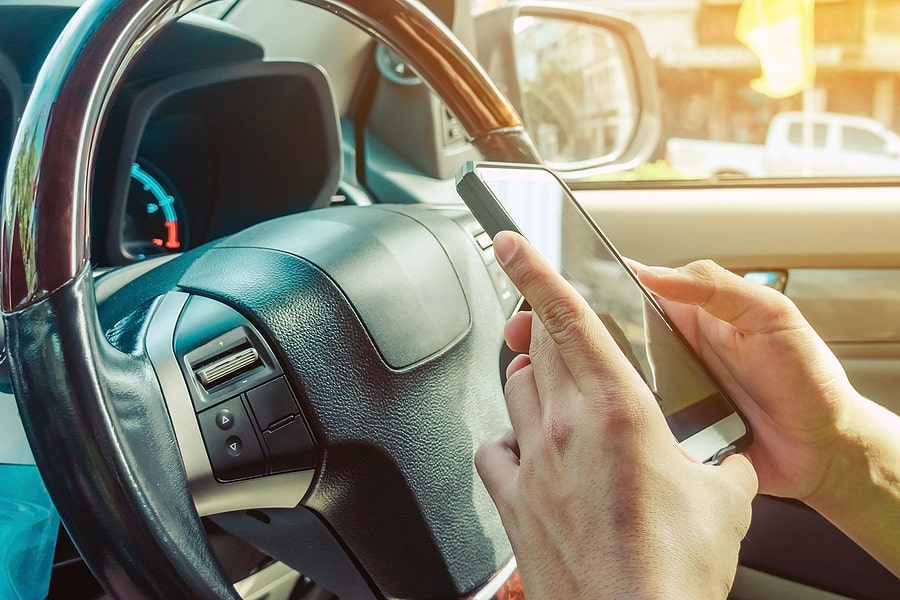In recent years, distracted driving claimed the lives of more than 2,800 individuals annually and caused thousands more severe injuries, permanently altering the lives of driving victims. An estimated 16 percent of fatal crashes and 21 percent of injury-involved crashes involve some level of distraction.
Unfortunately, drivers continue to drive distracted. Most drivers continue to admit to answering cell phone calls and even continue to talk on the phone while driving, and as many as 18 percent confess to sending texts or emails while their attention should remain on the road. Worse, even those drivers that recognize the dangers of cell phone use may fail to notice other forms of distraction when behind the wheel.
If someone hurts you while driving distracted, you may want to call a car accident lawyer to pay for your injuries.
Common Driver Distraction Challenges
Most people think first of cell phone use when they imagine distracted driving: texting, answering phone calls, or even scrolling social media or playing a game from behind the wheel of the vehicle. Distracted driving, however, can include anything that takes the driver’s hands, eyes, or attention from driving. Young drivers, especially teen drivers, become distracted more easily and may engage in more dangerous behaviors behind the wheel as a result.
Distraction may include:
- Eating or drinking while driving. Messy foods, thick drinks, or difficult-to-consume items may pose a particular distraction. Even unwrapping a piece of candy can temporarily remove both of the driver’s hands from the wheel.
- Putting on makeup. Many drivers attempt to make up time in the morning by taking care of grooming or self-care tasks during their commute.
- Chatting with someone in the vehicle. Drivers who become too wrapped up in a conversation may fail to notice potential hazards outside the vehicle.
- Handling children or pets in the vehicle. A quick look back at a child or pet can take the driver’s eyes and attention off the road for critical seconds.
- Adjusting the music or temperature controls. In an unfamiliar vehicle, where the driver cannot complete these actions by touch alone, it can prove especially distracting.
- Programming or checking a GPS. While a GPS can provide vital information about a driver’s route, it cannot help that driver avoid accidents and can, in fact, prove distracting enough to cause an accident, especially in heavy traffic.
Each time a driver’s attention drifts from the road, it can raise the risk of an accident substantially. Cars can travel the length of a football field in just five seconds. In that time, serious injuries or death can result.
Avoiding Distraction on the Road
Most drivers do not intend to become distracted, particularly not to the extent that it will cause an accident. Unfortunately, familiarity, habit, or simply not thinking through the potential ramifications of distracted driving can all substantially raise the risk that a driver will become distracted.
If you struggle with distracted driving habits, try some of these strategies to decrease your likelihood of taking your attention from the road.
- Do not multitask behind the wheel. Yes, you need to get your makeup on or get that meal down before you get to your destination. Yes, you may hear the chime of an incoming text message, and you feel that it needs your attention urgently. None of those tasks, however, should pull you away from your primary task: driving your vehicle safely. Do not multitask. Most people’s brains simply cannot multitask well, and those distractions could cause an accident before you even notice a potential problem.
- Pull over if you must answer your phone or read or respond to a text message. If you know you need to attend to an incoming message or call immediately, pull off the road to a safe place to do so. If possible, pull into a parking lot before pulling out your phone.
- Try setting your phone out of reach when you get in the car. If you struggle with the self-control to avoid “just checking a text message” or “answering a quick call,” get in the habit of leaving your phone out of reach. Tuck it in the glove box or leave it in the back seat.
- Turn off smart devices. Do you wear a smartwatch? The notifications that come through on your watch, which has a smaller screen than your phone, can prove more distracting than the device itself. Turn off notifications on those smart devices before getting behind the wheel.
- If you must eat or drink in the car, choose simple foods. Avoid messy sandwiches or foods that require a great deal of attention to eat properly. Stop to eat instead of eating behind the wheel when you can.
- Program your GPS before you start driving. Heading out to an unfamiliar destination? Program your GPS while still in the driveway. Also, avoid checking the details on it while driving. If you must change its programming or recheck directions, pull into the parking lot.
-

Car Accident Attorney, Joseph L. Benson II, Esq. Adjust temperature controls and set the music before you start driving. Get used to leaving those controls in place or adjusting them in safe locations, like while stopped at a red light or stop sign, instead of trying to adjust them while driving.
- Secure pets properly in the vehicle. Not only can wandering pets cause significant distractions, they may have a greater risk of serious injury in an accident if not properly secured. Keep pets strapped in or in a cage or carrier when possible.
- Leave a little more time in your daily schedule. Often, busyness causes distraction behind the wheel. If you constantly find yourself rushing to reach the next task, trying to multitask as you drive, leave a little more time. Get up earlier or remove some unnecessary tasks from your morning schedule. Ultimately, this will help make you and others you share the road with safer.
Avoiding distracted driving saves lives and helps decrease the risk of severe injury. If you suffered serious injuries in a distracted driving, an experienced car accident attorney can help you understand your rights. Contact a car accident lawyer as soon after your accident as possible to learn more about the compensation you deserve.
Benson & Bingham Accident Injury Lawyers, LLC
626 S 10th St
Las Vegas, NV 89101
702-382-9797



